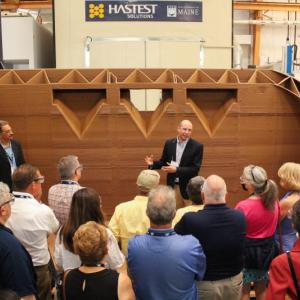UMaine’s research to promote housing, food security
 Chief operating engineer Evan Gilman, right, overviews innovation at the University of Maine Advanced Structures and Composites Center (ASCC) to 3D print biobased housing as founding director Habib Dagher looks on during a tour Friday that included legislators from the bipartisan Housing and Homelessness Caucus, and affordable housing developers.
Chief operating engineer Evan Gilman, right, overviews innovation at the University of Maine Advanced Structures and Composites Center (ASCC) to 3D print biobased housing as founding director Habib Dagher looks on during a tour Friday that included legislators from the bipartisan Housing and Homelessness Caucus, and affordable housing developers.
 Chief operating engineer Evan Gilman, right, overviews innovation at the University of Maine Advanced Structures and Composites Center (ASCC) to 3D print biobased housing as founding director Habib Dagher looks on during a tour Friday that included legislators from the bipartisan Housing and Homelessness Caucus, and affordable housing developers.
Chief operating engineer Evan Gilman, right, overviews innovation at the University of Maine Advanced Structures and Composites Center (ASCC) to 3D print biobased housing as founding director Habib Dagher looks on during a tour Friday that included legislators from the bipartisan Housing and Homelessness Caucus, and affordable housing developers.
Legislators, affordable housing developers and advocates visited University of Maine July 1 for a summit showcasing solutions to one of the state’s grand challenges The summit was organized by UMaine and the University of Maine System, in partnership with the Legislature’s bipartisan Housing and Homelessness Caucus and MaineHousing.
It included a tour of the UMaine Advanced Structures and Composites Center where research is underway to use Maine wood and the world’s largest 3D printer to help develop affordable housing. In the face of worker and supply shortages, the innovative process would reduce labor and materials needs and costs compared to standard construction, while improving housing sustainability and availability for those in need, according to a new release from UMaine.
A new Green Engineering and Materials Factory of the Future is planned to further expand the Composites Center’s world-leading work in biobased materials development. Already, $35 million in federal funding for the project, which is expected to break ground in 2023, has been secured by the Maine Congressional Delegation led by Sen. Susan Collins, and the Mills Administration has additionally committed $15 million through the Maine Jobs and Recovery Plan.
Visitors also heard from researchers with the UMaine Center on Aging about the housing and health needs of older Mainers, and how technology, smart engineering and technical assistance from the university can help communities become more livable across the life span — including to allow Mainers to age in place.
Participating legislators came from eight counties. Statewide housing providers like Community Housing of Maine and local housing authorities in communities, including Bath and Biddeford, as well as nonprofit health and social service organizations like Amistad, Preble Street and Penobscot Community Health Care also attended.
MaineHousing Director Dan Brennan said innovations that make building construction more efficient will be an important component to closing the housing gap in Maine and the U.S.
The group also went to Rogers Farm in Old Town, a university research site where crops are grown as part of sustainable agriculture research, and UMaine Cooperative Extension has teaching projects, and donates to area food pantries and shelters through the Maine Harvest for Hunger program.
Run by UMaine Extension, Harvest for Hunger helps home, school and commercial growers contribute extra fresh fruit and vegetables to those in need in their communities, a process known as gleaning. Since the program's inception in 2000, more than 3.3 million pounds of produce has been donated. More information is available at extension.umaine.edu/harvest-for-hunger. Extension’s Expanded Food and Nutrition Education Program that serves low-income Mainers was also overviewed during the visit.
The Black Bear Exchange, UMaine’s on-campus food and clothing pantry, also receives produce through the program and was highlighted Friday as part of a university-led discussion on its efforts to meet students’ basic needs and realize social mobility through affordable access to higher education.
Last month following supplemental appropriations from the Legislature and Gov. Janet Mills, UMS Trustees voted to hold in-state tuition flat for the seventh time in a decade to help Maine students and families recover from the economic impact of the pandemic and in the face of inflation. Additionally, since the start of the pandemic, Maine’s public universities have passed onto students more than $55 million in emergency aid provided through three federal relief packages.
























